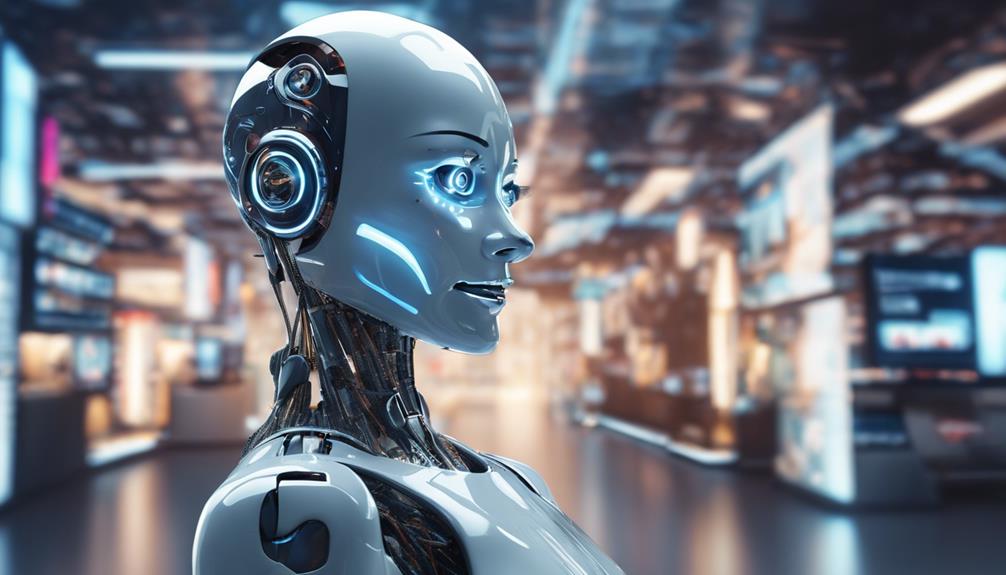In the realm of customer service, the integration of Artificial Intelligence (AI) has transformed how we engage with customers. AI-powered platforms can handle customer inquiries effectively and provide personalized responses, leading to improved efficiency in business operations.
However, the question remains: as AI continues to evolve and demonstrate its prowess in customer service, what implications does this hold for the future of human involvement in customer interactions? The interplay between AI and human touchpoints in customer service is a topic that sparks curiosity and prompts reflection on the evolving landscape of customer engagement.
Key Takeaways
- AI streamlines customer interactions, reducing human intervention effectively.
- Automation handles repetitive tasks, improving response times and scalability.
- AI enhances customer experience with personalized, predictive solutions.
- AI boosts efficiency, analyzing data seamlessly for better decision-making.
AI Advantages in Customer Service
Artificial Intelligence (AI) presents significant advantages in the realm of customer service, revolutionizing how businesses interact with their clientele through innovative automation and personalized experiences. AI technologies, such as machine learning algorithms, enable the analysis of vast amounts of customer data to tailor interactions, ultimately enhancing the overall customer experience.
Virtual assistants, a prominent application of AI in customer service, not only provide 24/7 support but also cater to diverse customer bases by offering assistance in multiple languages.
Moreover, AI can automate repetitive processes in customer service, allowing businesses to streamline operations, reduce operational costs, and increase productivity. By handling routine inquiries efficiently, AI-powered chatbots free up human agents to focus on more complex issues, ultimately improving service quality and customer satisfaction.
This strategic utilization of AI technologies in customer service showcases how businesses can leverage automation to deliver personalized interactions and elevate the standard of customer care.
Automation in Customer Support

The integration of automated systems in customer support has revolutionized how businesses handle inquiries and provide assistance to their clientele.
- AI-powered chatbots and virtual assistants streamline customer queries efficiently.
- These systems excel at handling repetitive tasks like FAQs and simple transactions.
- Automation enables businesses to reduce response times, operate 24/7, and scale support operations effectively.
- AI-driven chatbots employ natural language processing for real-time customer interactions.
- Integration of automation can lead to cost savings, increased satisfaction, and improved efficiency.
Automation in customer support leverages AI tools developed through AI research, incorporating common sense and predictive analytics. Just as successful AI has been applied in self-driving cars, it enhances customer service by offering swift, accurate responses. By utilizing automated systems, businesses can provide seamless support, ensuring customer needs are met promptly and effectively.
Enhancing Customer Experience With AI
Advancements in AI technology have significantly elevated the potential for enhancing customer experience through personalized interactions and instant responses. Artificial intelligence plays a crucial role in revolutionizing customer service by leveraging machine learning algorithms to analyze vast amounts of customer data swiftly. This analysis enables businesses to predict customer needs accurately and offer tailored solutions efficiently, leading to higher satisfaction levels.
| AI Benefits for Customer Experience |
|---|
| 1. Personalized Interactions |
| 2. Instant Responses |
| 3. Predictive Analytics |
| 4. 24/7 Support |
Virtual assistants powered by AI have become instrumental in handling routine customer queries, allowing human agents to focus on more complex issues. These virtual assistants, such as AI chatbots, simulate human-like conversations, providing round-the-clock support and quick resolutions to customer inquiries. The automation brought by AI in customer service not only drives cost savings and increased productivity but also enhances overall customer satisfaction. Through AI, businesses can deliver a seamless and efficient customer experience, setting new standards in the realm of customer service.
Efficiency Through AI in Customer Care

Elevating operational efficiency and customer satisfaction, AI implementation in customer care optimizes processes and enhances service quality through automation and personalized interactions.
- Research and Development: Constant advancements in AI technology drive innovation in customer care solutions.
- AI Algorithms: Complex algorithms allow AI systems to process vast amounts of data efficiently.
- Human Interaction: AI enables seamless human-computer interactions, creating a more natural customer experience.
- Real-World Problems: AI in customer care addresses practical issues faced by businesses and customers alike.
- Large Amounts of Data: AI can sift through and analyze large volumes of data to provide valuable insights for decision-making processes.
Through continuous research and development, sophisticated AI algorithms, and the ability to handle vast amounts of data, AI streamlines processes, empowers personalized customer interactions, and resolves real-world problems efficiently. This results in enhanced operational efficiency and improved customer satisfaction, making AI a valuable asset in modern customer care strategies.
AI Impact on Customer Relations
Analyzing customer interactions through AI technology offers valuable insights to enhance and nurture customer relations efficiently. AI impacts customer relations through two factors: the ability to analyze vast amounts of data quickly and the capability to find solutions based on patterns and trends.
AI in customer service no longer simply requires a human touch but combines human intelligence with machine efficiency. The use of AI in customer relations enables businesses to understand individual customer needs better, predict behaviors, and tailor interactions accordingly. By leveraging AI algorithms, companies can offer personalized experiences, recommend products or services with precision, and resolve issues promptly.
This intelligence-driven approach enhances customer satisfaction, loyalty, and overall service quality. The strategic implementation of AI tools, such as sentiment analysis, empowers organizations to proactively address customer concerns, improve communication, and foster stronger relationships.
In essence, the integration of AI elevates customer relations by optimizing interactions and delivering tailored experiences efficiently.
Frequently Asked Questions
What Are the 4 Powerful Examples of Artificial Intelligence?
Four powerful examples of artificial intelligence include IBM's Watson Assistant for customer queries, Google Assistant and Amazon Alexa for voice support, NLP algorithms for accurate interactions, and Lexalytics for sentiment analysis. These technologies enhance customer experience and streamline operations.
What Are 4 Types of Artificial Intelligence?
The 4 types of artificial intelligence include reactive machines, limited memory AI, theory of mind AI, and self-aware AI. These AI systems vary in their capabilities, from making decisions based on current data to potentially having consciousness and understanding human emotions.
How Is AI Used Today?
Artificial Intelligence is utilized across industries for data analysis, automation, and decision-making. AI enhances efficiency, personalization, and prediction capabilities in tasks ranging from healthcare to finance. Its impact is profound and pervasive in modern society.
Can You Explain Artificial Intelligence?
Artificial Intelligence is the emulation of human intelligence processes by machines. It encompasses learning, reasoning, and problem-solving abilities. AI systems can analyze data, recognize patterns, and make decisions autonomously, leading to efficient and automated operations.
Conclusion
In conclusion, the integration of artificial intelligence in customer service operations offers numerous advantages, including enhanced efficiency, automation of support processes, and improved customer experiences.
As AI continues to advance, its impact on customer relations will become even more profound. The use of AI technologies in customer service is akin to a double-edged sword, cutting through traditional practices and paving the way for a more streamlined and effective approach to meeting customer needs.









